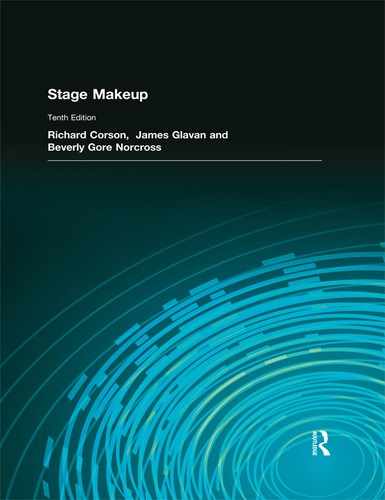Introduction
The actor’s dream is to play a wide range of characters, to explore many facets of life in roles that encompass all humanity. To fulfill this dream, the actor requires not only talent and training but an unstinting devotion to the art.
In many areas of this endeavor actors are assisted by the artistry and technical skills of brilliant craftspeople. From the original script to the set, lighting, and costumes, every effort is made to achieve perfection. Curiously, in the field of makeup, actors are left quite to their own devices. Except for the rare production so exotic or stylized that a specialist is necessary, actors must design and execute their own makeup.
It is therefore of considerable concern that many young professionals in the theater are unfamiliar with even so elementary a problem as projection of the actors’ features, essential to the fullest communication of the characters’ inner lives. Even on the rare occasions when a professional makeup artist is available, it is still the actors who are more aware than anyone else of the special problems posed by their own features and by the characters they are playing. Thus, it is the responsibility of each actor to learn the craft of makeup, that final dressing of the character that will enable him or her to perform the role as fully and as effectively as possible.
In addition to such fundamentals as the assimilation and projection of the character in terms of age, environment, and health, there is an area of psychological support that makeup can give actors comparable only to the assistance of a perfect costume. Just as robes or rags can give actors the “feel” of a character, so also can makeup. The visual image reflected in their dressing room mirrors can be as important to the actors as it will later become to the audience.
The authority of the arch of a brow or the sweep of a profile can be as compelling as Lear’s crown and scepter. The psychological effect of shadows and pallor or glowing health can be as conducive to mood and manner on stage as in life, while an impudent tilt to a nose or the simple graying of the hair will inevitably make more specific the delineation of character. The most detailed and subtle characterization can be performed only with full freedom and authority when the actors know that the visual image supports and defines their work.
Actors untrained in makeup are deprived of an invaluable aid to their art—and little is done to remedy the situation. Large universities may give courses in makeup intermittently or not at all. Drama schools often merely glance at the problem or train in outmoded techniques. And actors must shift for themselves or hope for the casual assistance and hand-me-down techniques of fellow artists.
It is therefore most exciting and encouraging to all actors when a book such as this comes to our rescue. Richard Corson’s approach to makeup is meticulous and eminently practical. Perhaps even more important is his stress on the creative aspects of makeup and the avoidance of stereotypes and formulae. The insistence on supporting technical skill with imagination and individuality reflects a positive and rewarding approach. With fullest exploitation of the mind and the senses, an unsuspected range of roles exists for each of us. It is through the assistance of the art and craft of makeup presented in this book that we can hope for a more complete realization of our goals in acting.
Uta Hagen
